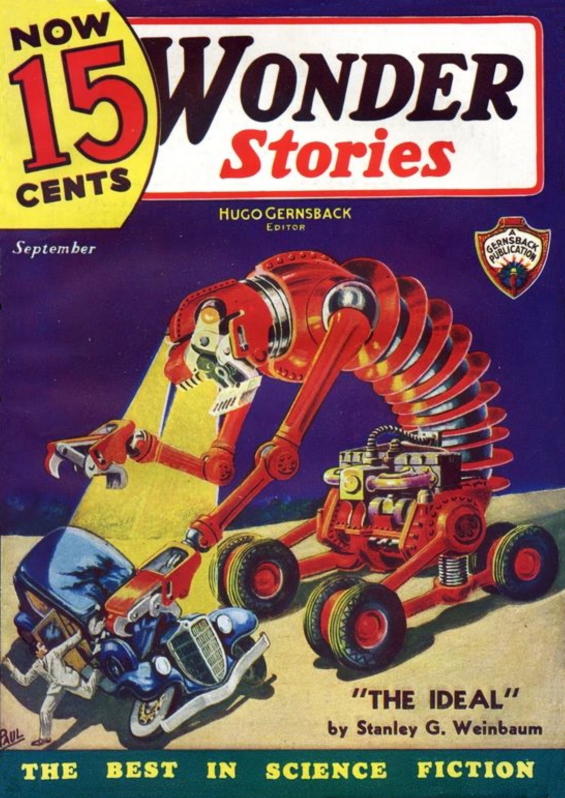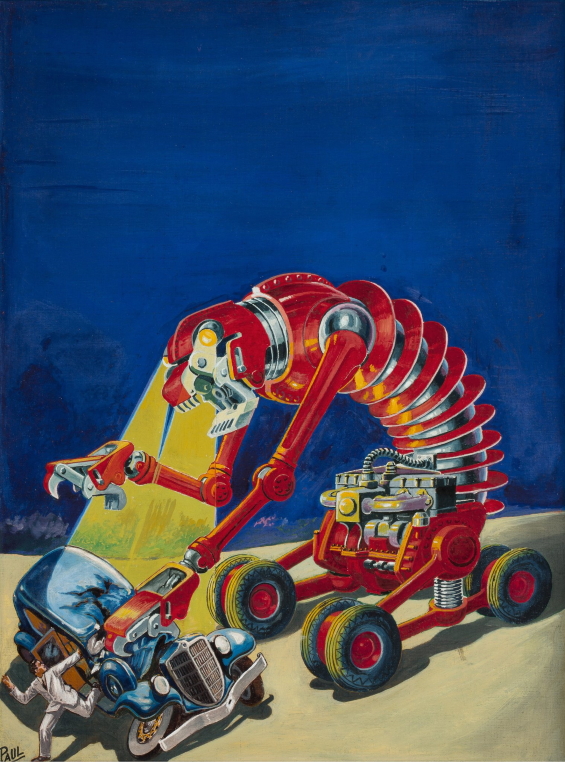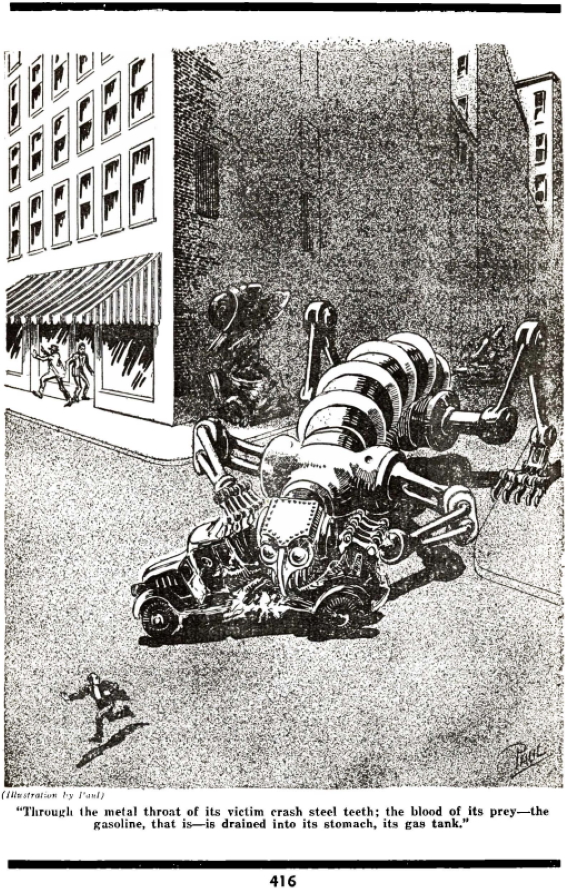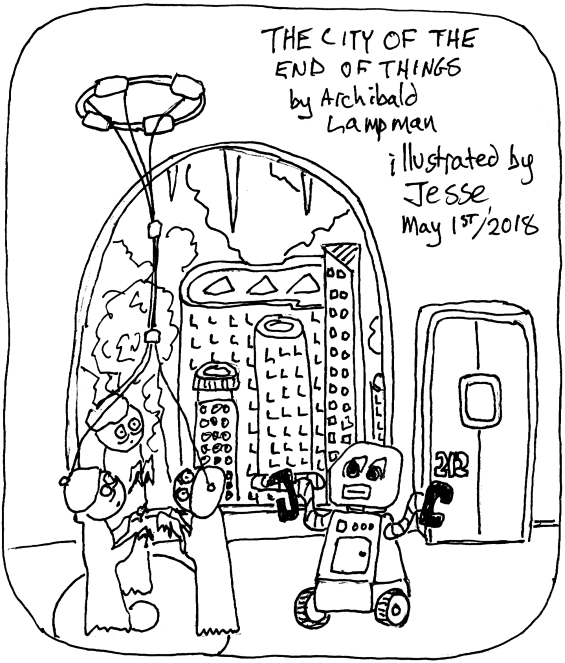
 The SFFaudio Podcast #649 – The Ideal by Stanley G. Weinbaum; read by Gregg Margarite. This is an unabridged reading of the story (37 minutes) followed by a discussion of it. Participants in the discussion include Jesse, Paul Weimer, and Tony De Simone
The SFFaudio Podcast #649 – The Ideal by Stanley G. Weinbaum; read by Gregg Margarite. This is an unabridged reading of the story (37 minutes) followed by a discussion of it. Participants in the discussion include Jesse, Paul Weimer, and Tony De Simone
Talked about on today’s show:
Star Trek Wars podcast, Tony’s pick, Pygmallion’s Spectacles, Weinbaum, Gregg Margarite, thematic resonances, interestingly similar, three Professor Van Manderpootz, big lib goggles, a little dated, male female relations, of its time, a strong male gaze, in the context of this story, he uses his gaze to create the ideal woman, an absolute cad, out for girls, not empathetic, defeated by reading the story, the girl puts her face in the oven, her male ideal, the uncle in Pygmallion’s Spectacles, Albert Ludwig, another European scientist type, inflated ego and opinion, Gregg had great taste in Science Fiction, like Wayne June, reads like a robot, straight narration vs. performance narration, Mark Twain, treating it like a serious hobby, Acoustic Pulp (Gregg Margarite’s blog listing his recordings), a really great idea man, a tradition, Philip K. Dick has a Van Manderpootz style character, scolded and cajoled, Doc Brown from Back To The Future, Doc Labyrinth, The Short Happy Life Of The Brown Oxford, from this tradition, a fine and upstanding tradition, philosophical stuff, the middle one, Worlds Of If, Dixon Wells, how things might have happened differently, the Mirror Universe, the subjunctivisor, stand alone but in sequence, the perfect woman, she married the pilot, how the male gaze is done by the female, the secretary through the eyes of the janitor, you notice it is fun, its incredibly deep, a magazine named after, What IF…, If This Goes On…, projecting into the future, from 2014-2015, the great stock market crash of 2009, a lot of smoking, incredible output, the perfect, John Rawls veil of ignorance, a good happy and non painful life, its ridiculous, three new particles, really early technobabble (in service), Plato and The Republic, we all want justice, what is justice?, doing right to your friends and doing harm to your enemies, to be virtuous in all actions, where learning comes from, our reality is a shittier version of the perfect, the trauma of childbirth gave you amnesia, learning is actually remembering, what makes a chair a chair is we know it from the ideal of the chair, why we recognize things, instinctual fears, the perfect house, Poe wrote a whole essay about the perfect room, psychons, that hairstyle is more attractive, big hair and shoulder pads, Miami Vice, generated by the things exposed to in youth, active in advertizing from 25 years ago, Somewhere In Time (1980), Jack Finney is sooo nostalgic, Midnight In Paris (2011), nostalgia as a receding window, Ray Bradbury is sooo nostalgic, an idealization of a perfect time in the past, Halloween, he lives there, he dwells there, a place where he was, how he was, only if you believe in this idea of the perfect, an exploration and a ridiculing of the perfect, anything after 1899 was uninteresting, movies from the 1970s vs. stories from the 1970s, the perfect girl, her costume, cuirasses are back in fashion, body armor and shorts, standard from 1930s magazines, Return Of The Jedi, Leia’s costume is 1930s brass braziers, a male Jabba gaze, long sensuous hair tentacles, what makes Star Wars work so well is its coming out and a harkening back, the serials and the pulps, Buck Rogers, Flash Gordon, wearing swords and cuirasses, flying vehicles and Ming the Merciless, an inconsequential comedy piece, there is this perfect woman out there for me, a new reality, very subtle, an examination of the phenomenon and a dismissal of it, an element of Van Manderpootz, he tells us he’s smart, his wiseness is not as high as his smartness, taking the robot apart, his plan went afoul, the cover of Wonder Stories, its in the story (just not the focus), they idealized it, a guy sticking his head into a cannon, people with TV heads, robosaurus, if he had built it it would have been a disaster, the ideal predator for an urban jungle, the tradition going back to Mary Shelley’s Frankenstein, the message of Frankenstein is if you’re going to have kids don’t abandon them, embracing the and, the most discussed one, 1. there are some things man was not meant to know!, 2. playing God is wrong, connected to making babies, God is making babies, creating Hell on Earth, instead of living peacefully in heaven forever, adaptations (the movies), hubris, show off his intelligence, of that ilk, driven to defeat death, a creature that is immortal, the creature punishes him, if you get a dog don’t abuse it, rejected by society, our hero is a little bit too ditzy, he’s not committed (even to showing up on time), so distraught he starts showing up to work on time, oh I know that girl, her second husband (she’s had seven), an object of massive desire, brilliant as he is, he makes a good uncle, the relationship between Doc Brown and Marty McFly, the circular loop, it doesn’t make sense to look at as a Heinleinian loop, Predestination (2014) and All You Zombies, the avuncular uncle, Doc I need more power, the same comedic relationship, getting in bed with the Libyans, the same story a different phenomenon, public domain heroes, John R. Peirce’s The Higher Things, Harry Harrison, romances, I I Dixon Wells, Heloise And Alebard, from the medieval time period, a missed opportunity, a very Star Trek thing to do: Newton, Hawking, Tpau of Vulcan, the iceberg approach, A Pale Light In The Black by K.B. Wagers, the only music is Star Trek is jazz, classical, and Klingon opera, Dixon Hill, the ideal romance, Marty McFly isn’t that interested in science, Sophie Wenzel Ellis, tragic romances, the real answer, Creatures Of The Light by Sophie Wenzel Ellis, a eugenicist, pile on pile on pile on pile on, extra stuff at the beginning, Aucassin and Nicolette, auggh gasoline!, fixed eyes or fixed cameras, phone camera AI, categorizing and tagging, blinders and a mirror, what does this heterosexual young man see?, dating dancers, what other people thought was the perfect woman, nothing about her brain, Weinbaum is very wise, it feels so easy but it is super deep, Dawn Of Flame, a plague in the 2020s, The Black Flame, Kentucky, Black Margo, conquering the world for good, as very poignant piece vs. clinical and cute, wise, wistful, our naive hero, he’s literally teaching us, he taught so many people what science fiction could be, read more Weinbaum, he wrote a lot for a guy who didn’t live very long, Ray Bradbury is genuine and enthusiastic, love and reverence for poetry and prose, the least political writer, cars and trains, The Pedestrian, Fahrenheit 451 seems very political, book burning vs. the danger of television, a magic way to get to Mars, never learned to live (living in Los Angeles) is pretty weird, The Small Assassin, the image of a homicidal baby, Pet Semetary by Stephen King, revealing truths, making the wisdom go down very easy, a jerk vs. a ditz, he could literally destroy the planet, killing machines, the robot is probably named after Isaac Newton, a Jew, Ray Bradbury’s obsessions are kind of what people wanted, that small town vibe, a nice way of thinking of reality, Disney’s Up is too nostalgic for Jesse, noir fiction, hard SF, hard boiled, well written and easy to take in, A Martian Odyssey, a Star Trek bridge crew, each alien is different, silicon based lifeforms, how a bird would think, H.G. Wells’ The War Of The Worlds, they’re comprehensible, based in threes, vampires, what would happen to people as we evolved, taking in your food through your skin, grey aliens.




Posted by Jesse WillisBecome a Patron!


